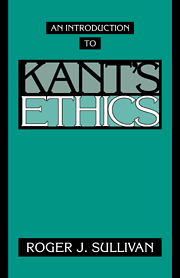Book contents
- Frontmatter
- Contents
- Introduction
- 1 A Beginning: Kant's Political Theory
- 2 The Categorical Imperative: The Ultimate Norm of Morality
- 3 The Formula of Autonomy or of Universal Law
- 4 The Formula of Respect for the Dignity of Persons
- 5 The Formula of Legislation for a Moral Community
- 6 The Limits of the Categorical Imperative
- 7 Morality and Prudence (Foundations 2)
- 8 Moral Character
- 9 Living under the Moral Law
- 10 The Defense of Morality (Foundations 3)
- Suggestions for Further Reading
- Index
2 - The Categorical Imperative: The Ultimate Norm of Morality
Published online by Cambridge University Press: 05 November 2009
- Frontmatter
- Contents
- Introduction
- 1 A Beginning: Kant's Political Theory
- 2 The Categorical Imperative: The Ultimate Norm of Morality
- 3 The Formula of Autonomy or of Universal Law
- 4 The Formula of Respect for the Dignity of Persons
- 5 The Formula of Legislation for a Moral Community
- 6 The Limits of the Categorical Imperative
- 7 Morality and Prudence (Foundations 2)
- 8 Moral Character
- 9 Living under the Moral Law
- 10 The Defense of Morality (Foundations 3)
- Suggestions for Further Reading
- Index
Summary
We are now ready to examine Kant's doctrine in his famous little book with the off-putting title of Foundations [or Groundwork] of the Metaphysics of Morals. In the preface to that book, he wrote that he intended mainly to set out the ultimate moral norm and defend its ability to obligate us (392). We have already seen that law in the form of the Universal Principle of Justice, but in the Foundations Kant restated it so it would apply not only to our behavior but also to our aims and motives.
We have also seen that in Kant's political theory the relations between persons in the state of nature and even within civil society are marked by discord arising out of conflicting desires. This strife has its counterpart within each individual, in our experience of internal moral conflict between our reason and our desires. We may not want to obey the moral law; we may also have – in fact, often have – desires we would prefer to satisfy. For this reason, all moral laws appear to us as imperatives. Moreover, because nothing can justify disregarding our moral obligations, they obligate us absolutely, or categorically. Consequently, in the Foundations Kant called the ultimate moral norm the “Categorical Imperative.”
There is and can be but one such ultimate norm (421), but Kant offered three different versions or formulas, each with its own particular emphasis. He preferred the first for its formality, but he also thought that alternative ways of wording it might make its meaning more transparent and compelling to us, his readers (436–7).
- Type
- Chapter
- Information
- An Introduction to Kant's Ethics , pp. 28 - 45Publisher: Cambridge University PressPrint publication year: 1994



